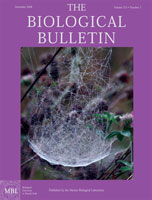 |

For further information, contact the MBL Communications Office at (508) 289-7423 or e-mail us at comm@mbl.edu
FOR IMMEDIATE RELEASE, December 26, 2008
Contact: Carol Schachinger, 508-289-7149, cschachi@mbl.edu
A New Science of Consciousness is Explored in The Biological Bulletin
 |
 |
|
Click for full-sized image: An image of a spider web near Verona, Wisc., on the cover of the December 2008 issue of The Biological Bulletin. Here the web metaphorically represents a quale, which is the shape of a conscious experience, a concept discussed by author Giulio Tononi in this issue. Photo: Giulio Tononi and Chiara Cirelli. Cover design: Beth Liles (Marine Biological Laboratory).
|
MBL, WOODS HOLE, MA—Everyone knows what consciousness is by knowing what happens when we lose it, either through trauma or in dreamless sleep: To the mind, everything ceases to exist. But can consciousness be measured and scientifically described as accurately as entities like cosmic radiation, or processes like enzyme kinetics? Two position papers in the December issue of The Biological Bulletin argue: Yes.
In “Science of the Conscious Mind,” Giorgio A. Ascoli and Alexei Samsonovich of George Mason University propose a “radical research paradigm shift to embrace the subjective conscious mind into the realm of objective science.” While great progress has been made in neuroscience and neurobiology to quantify neural circuitry and behavior at many scales, from molecules to whole organisms, the element of the conscious mind – subjective feelings – are absent from the models. Basing their studies in neurobiology and physics, the authors propose a series of reproducible experiments that may help quantify subjective mental states, in contrast to physically measurable sensory and motor behaviors.
Giulio Tononi of University of Wisconsin, Madison, proposes a theoretical framework for the study of consciousness in his article, “Consciousness as Integrated Information: a Provisional Manifesto.” While data exists on the neural correlates of consciousness – for example, defined parts of the cerebral cortex are known to influence certain qualitative aspects of consciousness, such as the experience of color or sound – we cannot explain why they correlate, or how. Tononi likens the present state of consciousness studies to the field of biology prior to Darwin’s publication of “On the Origin of Species” in 1859, when voluminous information on the natural world had been collected but there was no theoretical framework in which to interpret it. Tononi proposes a solution from phenomenology: the Integrated Information Theory (IIT), in which consciousness is equated with integrated information, or the amount of information generated by a complex of elements, above and beyond the information generated by its parts. His article guides the reader through several thought experiments demonstrating the feasibility of IIT for unifying studies of consciousness.
For a copy of any of these papers, please contact Carol Schachinger at cschachi@mbl.edu or visit The Biological Bulletin online at www.biolbull.org.
Published since 1897 by the Marine Biological Laboratory (MBL) in Woods Hole, Massachusetts, The Biological Bulletin is one of America's oldest, peer-reviewed scientific journals. It publishes outstanding experimental research on the full range of biological topics and organisms, from the fields of Neuroscience, Behavior, Physiology, Ecology, Evolution, Development, Reproduction, Cell Biology, Biomechanics, Symbiosis, and Systematics; and it especially invites articles about those novel phenomena and contexts characteristic of intersecting fields. The electronic version, Biological Bulletin Online, contains the full content of each issue, including all figures and tables, beginning with the February 2001 issue. PDF files of the entire archive from 1897-2000 are also available.
The MBL is a leading international, independent, nonprofit institution dedicated to discovery and to improving the human condition through creative research and education in the biological, biomedical and environmental sciences. Founded in 1888 as the Marine Biological Laboratory, the MBL is the oldest private marine laboratory in the Western Hemisphere. For more information, visit www.MBL.edu.
|